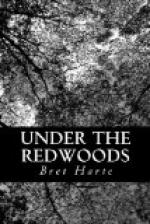“Where’s the radish, Li Tee?” said the Editor suspiciously.
“No hab got. Ask Mellikan boy.”
“What?”
Here Li Tee condescended to explain that on passing the schoolhouse he had been set upon by the schoolboys, and that in the struggle the big radish—being, like most such monstrosities of the quick Californian soil, merely a mass of organized water—was “mashed” over the head of some of his assailants. The Editor, painfully aware of these regular persecutions of his errand boy, and perhaps realizing that a radish which could not be used as a bludgeon was not of a sustaining nature, forebore any reproof. “But I cannot notice what I haven’t seen, Li Tee,” he said good-humoredly.
“S’pose you lie—allee same as Johnson,” suggested Li with equal cheerfulness. “He foolee you with lotten stuff—you foolee Mellikan man, allee same.”
The Editor preserved a dignified silence until he had addressed his letter. “Take this to Mrs. Martin,” he said, handing it to the boy; “and mind you keep clear of the schoolhouse. Don’t go by the Flat either if the men are at work, and don’t, if you value your skin, pass Flanigan’s shanty, where you set off those firecrackers and nearly burnt him out the other day. Look out for Barker’s dog at the crossing, and keep off the main road if the tunnel men are coming over the hill.” Then remembering that he had virtually closed all the ordinary approaches to Mrs. Martin’s house, he added, “Better go round by the woods, where you won’t meet any one.”
The boy darted off through the open door, and the Editor stood for a moment looking regretfully after him. He liked his little protege ever since that unfortunate child—a waif from a Chinese wash-house—was impounded by some indignant miners for bringing home a highly imperfect and insufficient washing, and kept as hostage for a more proper return of the garments. Unfortunately, another gang of miners, equally aggrieved, had at the same time looted the wash-house and driven off the occupants, so that Li Tee remained unclaimed. For a few weeks he became a sporting appendage of the miners’ camp; the stolid butt of good-humored practical jokes, the victim alternately of careless indifference or of extravagant generosity. He received kicks and half-dollars intermittently, and pocketed both with stoical fortitude. But under this treatment he presently lost the docility and frugality which was part of his inheritance, and began to put his small wits against his tormentors, until they grew tired of their own mischief and his. But they knew not what to do with him. His pretty nankeen-yellow skin debarred him from the white “public school,” while, although as a heathen he might have reasonably claimed attention from the Sabbath-school, the parents who cheerfully gave their contributions to the heathen abroad, objected to him as a companion of their children in the church at home. At this juncture




